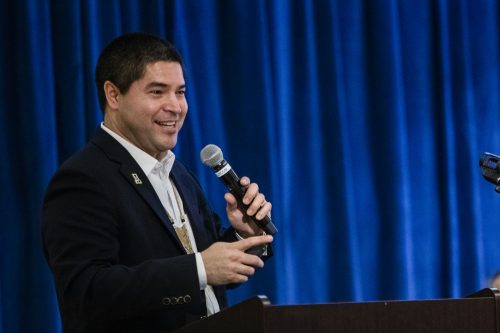Friday Focus: CRCD bridges rural Alaska, UAF
April 4, 2019

— by Evon Peter, vice chancellor, rural, community andNative education
The College of Rural and Community Development recently hosted a gathering in Fairbanks that included faculty, staff and administrators of the rural campuses. We came together to build and nurture relationships, train in student advising, work on the academic structure of CRCD, and develop a vision for the future of our programs, campuses and college.
CRCD has a service area that includes 160 communities, 140 Alaska Native tribes and 392,000 square miles of land. Our rural campuses are the front door to the University of Alaska for two-thirds of the state, fulfilling a unique role in helping meet local needs of community partners and students, and in addressing workforce and academic needs among a diverse population. CRCD is also present on the Troth Yeddha’ Campus, offering comprehensive student advising through Rural Student Services, a dormitory at Eileen’s House and a summer high school bridging program with the Rural Alaska Honors Institute.
At the CRCD gathering, one session focused on discussing unique attributes of the college, and I felt it timely to use this week's column to shine a light in that direction.
CRCD is a bridge to rural Alaska for the university. Each of our rural campuses is embedded in the regions they serve, with extensive local partnerships such as the partnership between the Kuskokwim Campus and the Yukon-Kuskokwim Health Corp. and Association of Village Council Presidents, which support students with tuition and employment in the Rural Human Services program. The RHS program trains local residents to serve as counselors in their communities. These relationships and extensive work experience in rural and Alaska Native communities situate CRCD well in serving as a bridge to UAF and the university system.
The rural campuses provide support to students independent of the degree program they are working to complete. The campuses offer a welcome and encouraging environment where the mantra is "everyone can succeed with the right support." We work to meet the students where they are at and offer comprehensive advising. Our service is often award-winning, as recently reflected in the 2019 Alaska ACT Workforce Champion Award being presented to Miranda Musich, a Northwest Campus applied business faculty member.
Academic and workforce programs that are administered through the college have an intentional focus on being rural- and Alaska Native-serving. The campuses and programs are flexible and adaptive in meeting local needs. They structure and schedule courses and entire programs through multiple modes of delivery to support students through degree completion, be it synchronous, asynchronous, face-to-face intensives, cohort model, audio conference or standard semester-based courses. Many of the programs proactively integrate Indigenous knowledge and pedagogy into content delivery to help achieve a higher level of local relevance and quality. These approaches have helped UAF achieve 20% Alaska Native student enrollment and 17% of our total graduates across all degree programs in 2018 were Alaska Native.
There were many more attributes brought forward at the gathering, but I hope this piece helps highlight the significant and unique role that the College of Rural and Community Development fulfills at UAF and within our state. There are no true comparisons that can be made with institutions in the Lower 48, but to the students and communities we serve, the value and significance are clear.
Friday Focus is a column written by a different member of UAF’s leadership team every week.


